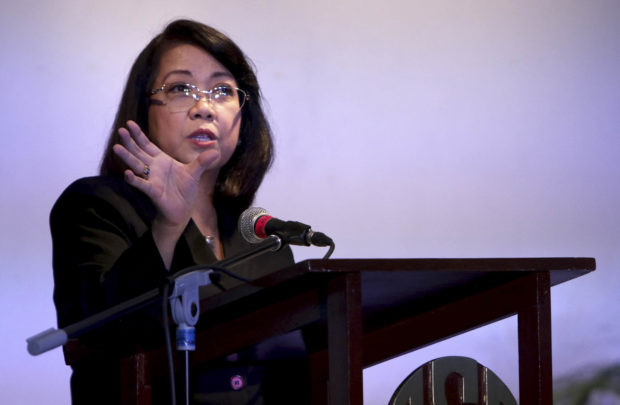
Chief Justice Maria Lourdes Sereno INQUIRER FILE PHOTO / RICHARD A. REYES
An applicant to a position in the judiciary who failed to submit his or her statement of assets, liabilities and networth (SALN) to the Judicial and Bar Council (JBC) would not negate the person’s “integrity,” Chief Justice Maria Lourdes Sereno said in her memorandum submitted to the Supreme Court.
Today is the deadline for the submission of memorandum of each of the parties in the quo warranto petition case before the Supreme Court.
READ: Calida on Sereno: ‘She should be measured by the same yardstick’
With the submission of the memoranda, the high court has submitted the case for decision.
READ: SC ruling on quo warranto case possible by May – Carpio
In her 147-page memorandum, Sereno said, the question on whether she is a person of “proven integrity” has been answered when the JBC has included her in the shortlist of nominees for the Chief Justice post.
She pointed out that the submission of SALN is not among the requirements set under the Constitution which are considered absolute.
Under the Constitution, the following requirements must be met to be appointed to the Supreme Court: 1. natural-born citizen; 2. at least 40 years old; 3. must have been for 15 years or more a judge of a lower court or engaged in the practice of law; and 4. must be a person of proven competence, integrity, probity and independence.
“In the last analysis, requiring the submission of SALNs as an absolute requirement would be tantamount to creating a new qualification for the position of Chief Justice,” Sereno said.
“It would be tantamount to amending the Constitution, which the JBC is powerless to do. In Social Justice Society vs. Dangerous Drugs Board, this Honorable Court stressed that the qualifications imposed by the Constitution for government officials could neither be expanded nor diminished,” she added.
She added that Solicitor General Jose Calida failed to prove that she did not submit her SALNs when she was law professor at the University of the Philippines.
“The submission of SALNs was simply among the additional documents which the JBC had required of applicants for the position of Chief Justice,” she pointed out.
Besides, Sereno stressed that no member of the JBC objected to her inclusion in the shortlist submitted to Malacañang, despite having had 11 chances to object to her candidacy on the ground of her failure to submit her UP SALNs.
She said the JBC, then headed by its acting ex-officio chair Associate Justice Diosdado Peralta, found the Chief Justice as “a person of proven integrity” with her inclusion in the shortlist, along with five other candidates—Acting Chief Justice Antonio Carpio; Associate Justices Arturo Brion, Teresita Leonardo De Castro and Roberto Abad; and Congressman Ronaldo Zamora—who did not submit all of their SALNs to the council.
“To stress, there is nothing wrong with the inability to submit complete SALNs to the JBC. Their inclusion in the shortlist means that the JBC had found all of them to be persons of proven integrity,” Sereno explained. /jpv